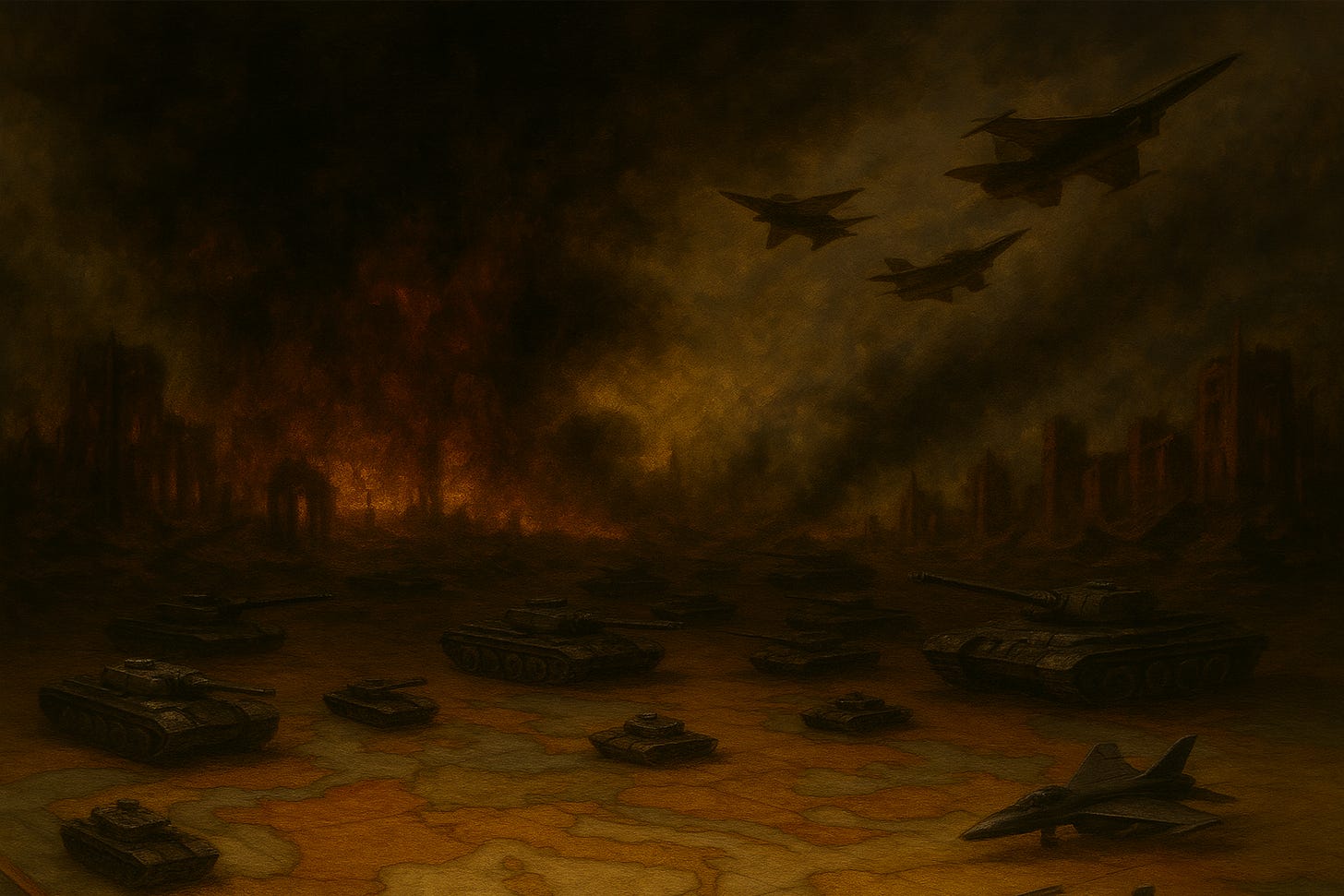Reflections on Current Wars
by Alain de Benoist
Alain de Benoist turns his gaze toward the wars of our time in their historical and metaphysical horizons. Exposing the contradictions of liberal societies that no longer know what it means to fight for their own existence, de Benoist confronts the moralizing blindness of the West with the enduring realities of power, politics, and collective destiny.
Wars are windows opened onto history. It is striking to observe, for example, that the West behaves today with Russia as it behaved in the past toward Byzantium. Laurent Guyénot is not wrong in this regard to write that the “American-British geostrategy of the Great Game, which has aimed for two centuries to keep Russia separated from Europe (and from Germany in particular) [...] is the continuation of medieval Western warfare against the Byzantine Empire.” The long term illuminates the meaning of things.
Classical wars normally end with defeat or capitulation, followed or not by a peace treaty. Metaphysical wars never have an end or, rather, they can only conclude through ethnic cleansing, that is to say through the total eradication of one of the belligerents. Netanyahu has declared several times that he sees in Hamas the latest incarnation to date of Amalek, thus situating the war in Gaza in a resolutely transhistorical perspective. In the Hebrew Bible, the name of Amalek designates by metonymy the eternal enemy of Israel: “Yahweh is at war against Amalek from generation to generation” (Exodus 17:16). Amalek is the archetypal enemy of Israel, and thus absolute evil. His memory must be erased, he must therefore be exterminated. One does not sign a peace treaty with Evil, one makes it disappear.
For One’s Homeland, Not Others’
Our contemporaries are in a state of mind that does not push them to accept waging war. Not because war is judged in principle as a “misfortune” (such a judgment is timeless), but because, being individualists, they draw the conclusion that no one can decide in their place on the advisability of risking their life.
Another reason is that they believe, contrary to what was generally believed in past centuries, that there is nothing worse than death — nothing worth the risk of dying for, nothing that transcends us. Faith and convictions are not perceived as being of such a nature as to sacrifice everything to them, especially since the idea has spread that after death, there is nothing.
This state of mind is perfectly consistent with liberal ideology. How can the liberal State call for defending the homeland when liberalism prohibits itself in principle from ruling on the “good life” and sees in society only a sum of individuals, the “homeland” being nothing more than a chimera?
When a liberal State wages war and asks its citizens to participate in it at the risk of getting killed, even while it tends to discredit any great collective project, it betrays itself. This is what Carl Schmitt observed well: “The political unity must demand, if necessary, that one sacrifice one’s life. But the individualism of liberal thought can in no way join or justify this requirement [...] For the individual as such, there exists no enemy against whom he has the obligation to fight to the death if he does not consent to it himself; to force him to fight against his will is in any case, seen from the perspective of the individual, an infringement on freedom and a form of violence.”
Europeans no longer know what war is, namely, an act of violence whose goal is peace. War is never anything but a means in service of a goal. And this peace is of a political nature, for the same reason that war itself is only an extension of politics.
In the Ukrainian affair, Europeans have never had any political, diplomatic, or strategic goal, instead having as their sole preoccupation to endlessly support, after rallying to it for purely ideological reasons, a war that Ukrainians were never in a position to win. Any war that is not accompanied by a political plan for peace can only lead to chaos. The United States and Israel are countries that are incapable of conceiving a political outcome because they are incapable of seeing wars as political facts and absolutely insist on bringing a moral judgment to bear on them. This is why they win all the battles — but lose all the wars.
“HOW CAN THE LIBERAL STATE CALL FOR DEFENDING THE HOMELAND WHEN LIBERALISM PROHIBITS ITSELF FROM RULING ON THE ‘GOOD LIFE’ AND SEES IN SOCIETY ONLY A SUM OF INDIVIDUALS?”
Carl Schmitt also recalled that war is only justified in the face of an existential threat weighing on our group of belonging (killing the enemy has no normative value, but an existential value):
“There is no rational purpose, no norm, however just it may be, no program, however exemplary it may be, no social ideal, however beautiful it may be, no legitimacy or legality that can justify the fact that human beings kill each other in their name. For, if at the origin of this physical annihilation of human lives there is not the vital necessity to maintain one’s own form of existence in the face of an equally vital negation of that form, nothing could justify it.”
“If [a people],” he added, “accepts that a stranger dictates to it the choice of its enemy and tells it against whom it has the right or not to fight, it ceases to be a politically free people and it is incorporated or subordinated to another political system. A war does not derive its meaning from the fact that it is waged for ideals or for norms of law; a war has meaning when it is directed against a real enemy.”
Europeans do not want to see Zelensky capitulate before Putin after having capitulated themselves at the first whistle to Trump’s demands on commercial matters. They wave like a rattle an improbable “Russian threat” supposed to frighten those who have been persuaded to support a cause that in no way corresponded to their own interests.
Who today wants to give their life for improbable “republican values”? Gone is the time when the poet Horace could write: “Dulce et decorum est pro patria mori” (”It is sweet and fitting to die for one’s homeland,” Odes, III, 2). For one’s homeland, he said, not for that of others.
Originally published in Éléments no. 216, October-November 2025
Translated by Alexander Raynor





